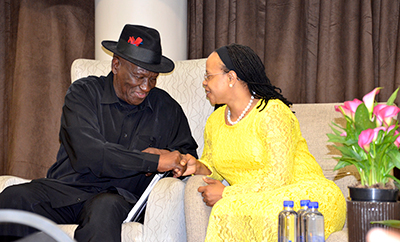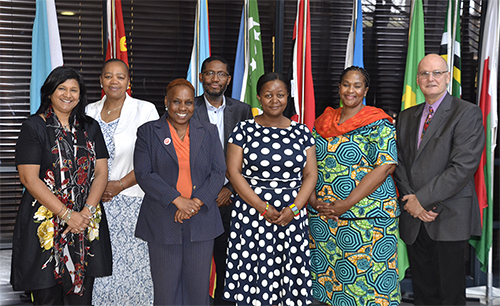

Bheki Cele (National Minister of Police) and Prof Thenjiwe Meyiwa (Vice-Principal: Research, Postgraduate Studies, Innovation, and Commercialisation, Unisa)
Boys and men need to be a big part of the solution to femicide and violence against women. This was the strong message delivered by the Minister of Police Bheki Cele along with an esteemed panel of gender-based violence (GBV) and human rights experts when they recently spoke at an event hosted by the College of Human Sciences (CHS) in collaboration with the Unisa HIV and Social Diversity Curriculum Integration Project.
Advocate Tseliso Thipanyane, CEO: South African Human Rights Commission; Prof Nokuthula Mazibuko, Associate Professor, CHS, and Event Project Leader; and Advocate Phumla N Dwane-Alphman, Social Activist: Human Trafficking, also formed part of the panel which addressed the topic of GBV and femicide.
South Africa has the world’s most progressive constitution, which protects and enshrines the rights of women, yet the country is the rape capital of the world. Intimate femicide or murder of a female partner is a very common crime in South Africa. Femicide in South Africa stands at one woman being killed by her intimate male partner every eight hours and one in four women in South Africa is a survivor of domestic violence.
Given the seriousness of this social ill, empowering women and men through all means possible is regarded as a national security and priority. This discussion aimed at kick-starting the work that needs to be done by government, non-governmental organisations, communities, and individuals.
The minister gave a personal account of his take on GBV and the role of society, individuals, and the South African Police Service. He was unforgiving about men who carry out acts of GBV. “What kind of father did you have if you hit a woman. Fathers, let’s talk to our boys. Teach them when you see a woman, you first see a human being and someone who is probably even more superior to you.”
He spoke on the culture of making boys and men feel that they are superior to girls and women. “We make boys think they are super kids; we teach our children this, that boys are superior to girls. It’s a culture we’re unconscious about and we must become conscious about it.”
Speaking as a father, Cele said: “Having a girl (daughter) pains me. I pace around the house before she enters, waiting for her to come, wondering will she enter alive, unraped? We have a nation that literally lives with a lot of fear. This fear doesn’t end when some girls enter the room; they fear what will the father or uncle do?"
He also addressed the issue of people insinuating that girls and women are to be blamed for GBV and femicide. “Girls are told they are invitees of trouble; this makes them double victims. Women have the right to create their surroundings as they want them. My call to young girls, at this stage in our country, just be vigilant. When the boy first points a finger at you, turn and walk away; the finger eventually turns into something else.”
Cele advised men: “Men, be men and protect our women. We must lead the safety of our women. Be hostile to those who abuse; let’s talk in our spaces. If we don’t take this up as our cause, we won’t win this war.”

Managa Pillay (Technical Advisor: Office of the CEO, HEAIDS), Prof Zethu Nkosi (Manager: CHS Office of Tuition, Learner Support, and Community Engagement), Adv Phumla N Dwane-Alphman (Social Activist: Human Trafficking), Adv Tseliso Thipanyane (CEO: South African Human Rights Commission), Prof Nokuthula Mazibuko (Associate Professor, College of Human Sciences, Unisa and Event Project Leader), Prof Mary Moleki (Director: School of Social Sciences, Unisa), and Leon Roets (HIV and Social Diversity Curriculum Integration Project Leader)
Thipanyane also spoke on the important role that men have to play. “The failure to deal with this as men is part of the challenge; we need to unpack and understand this.”
He said in the last 20 years in South Africa, the Human Rights Commission had picked up on an increase in GBV. “We are not doing enough as a country to make sure people know that women’s rights are human rights.”
The advocate also spoke on changing perceptions and attitudes: “We need to change attitudes of women to themselves—many women subscribe to the notion of patriarchy. We also need to change the way we raise our children in our homes, schools, and religious organisations. Any priest who tells me that women are inferior is not Christian.”
In her capacity as the event project leader, Mazibuko explained to the attendees that GBV is personal to everyone: “We all know a wife, daughter, mother, sister, affected.” As a mother to boys, she too spoke on the importance of teaching them to see women as human beings. But her message also extended to parents with daughters as she stressed the importance of teaching children how to love themselves, and instilling in them values of self-assurance and self-love.
Dwane-Alphman raised the critical issues that activists working in this space are passionate about, which is that such issues such as GBV and femicide should be spoken about and dealt with all year round. “It should not be an August project.” She also spoke to the academics in the room regarding their research in these areas and how are they using it to make a difference.
The event also paid tribute to the many women who worked tirelessly to liberate women (and men) in South Africa. Poet Natalia Molebatsi honoured the women who have walked before us, women such as Albertina Sisulu, Fatima Meer, and Zondeni Veronica Sobukwe, among many others.
*By Rivonia Naidu-Hoffmeester
Publish date: 2018-08-21 00:00:00.0